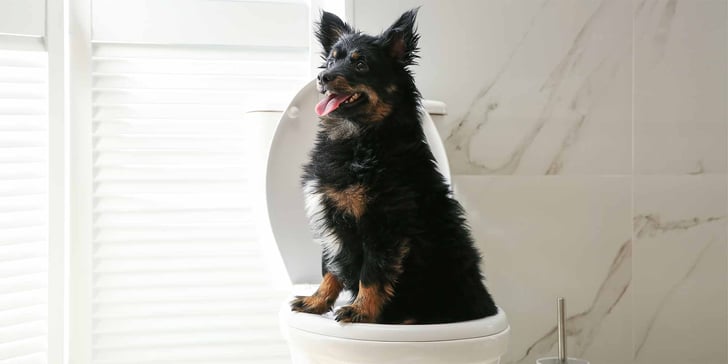How to Relieve Constipation in Dogs: Causes, Symptoms, and Treatment
Index:



Introduction
Constipation, a common digestive issue affecting the intestinal tract of dogs, can lead to discomfort and strain during defecation. Dogs of all breeds, sizes, and ages can be affected by this issue, a condition where the faeces become hardened, making it challenging to achieve normal bowel movements.
Some causes include a low-fibre diet, dehydration, anal glands issues, lack of exercise, side effects of certain medications, anatomical abnormalities, and particular medical conditions. This can be particularly distressing for any pet owner concerned about their pet's digestive tract health.
While occasional bouts of constipation might not raise alarm bells, prolonged or severe symptoms could indicate a more critical health issue within the gastrointestinal tract. Untreated constipation can lead to complications like rectal prolapse, impaction, and even intestinal tract obstruction. Therefore, it’s crucial to seek veterinary attention if your dog exhibits severe symptoms of constipation.
In this article, we'll explore the common reasons for constipation in dogs, identify symptoms, emphasise the importance of prompt medical advice, and treatments for constipation. We’ll also discuss preventive measures to ensure your dog's digestive tract remains healthy and functioning properly.
Symptoms of constipation in dogs



The symptoms of canine constipation can vary based on the severity and duration of the condition. Here are the most common signs that your dog might be constipated:
Infrequent or lack of defecation
Unproductive straining to poop
Hard, dry stools (a sign of insufficient fibre)
Lack of appetite or weight loss
Lethargy or decreased activity level
Abdominal discomfort or bloating
Straining or pain when urinating, which might suggest a urinary tract issue
Matted hair around the anus (Pseudocoprostasis)
If you notice any of these signs of discomfort, consult your vet for an accurate diagnosis and appropriate treatment.
It’s natural for dogs to experience mild constipation once in a while. However, if your dog frequently experiences chronic constipation, it's advisable to speak to a vet. If you are a Waggel member, you can access online vet care for free with Joii. Joii operates 24/7, alleviating the stress of pet parents.
Causes of constipation in dogs



Canine constipation can be attributed to a multitude of factors, including a low-fibre diet, dehydration, lack of exercise, medication, swallowing of indigestible items or a foreign body, and health conditions. If your dog seems constipated, it's vital to identify the underlying cause and seek immediate treatment.
To prevent constipation, your dog should adhere to a nutritious diet, have constant access to fresh drinking water, and avoid risk of injury from indigestible items. A high-fibre diet helps maintain proper functioning of the digestive tract and promotes regular bowel movements. Proper hydration helps soften stools, facilitating easier passage.
Home remedies for constipation in dogs



While home remedies should not replace professional veterinary care, there are some methods you can employ to provide temporary constipation relief.
Increase fibre: Adding fibre can stimulate the digestive system and promote regular bowel movements. Sweet potato and pumpkin powder are good options and can be easily added to your dog's food.
Hydration: Encourage your dog to drink plenty of water to help soften poop and facilitate easy passage. You could also consider adding extra water or warm water to your dog's meals.
Exercise: Regular exercise stimulates the digestive tract and promotes bowel movements. Daily walks or play sessions encourage physical activity and increase the chance of them having to go potty.
These remedies may not be effective for all instances of severe constipation or chronic constipation - such symptoms should always be evaluated by a vet.
Treatment for constipation in dogs



Canine constipation can cause discomfort and potentially lead to other health issues if left untreated. The treatment options for constipation can depend on the severity and underlying cause of the condition.
Increase hydration
Increase fibre
Exercise more
Speak to your vet about stool softeners, enemas, and medication
In cases of severe constipation, your vet might recommend over-the-counter stool softeners or laxatives. Enemas, where your vet introduces a liquid solution through your dog’s colon to soften the stool, may sometimes be necessary. However, don't administer any medication without seeking professional advice first.
It's crucial to note that while home remedies and over-the-counter treatments may provide temporary relief, it's always recommended to speak directly to a vet for a proper diagnosis and suitable treatment. Chronic constipation might indicate an underlying medical condition, and prompt veterinary care can prevent potential complications.
Preventing constipation in dogs
Maintaining your dog’s digestive health is crucial to prevent future instances of constipation. Ensuring your dog has access to fresh water, encouraging them to drink regularly, and feeding them a diet high in dietary fibre are beneficial. Dry food and wet food both have their merits, and a balance might be optimal.
Stress and anxiety can also cause constipation, so it’s best to avoid stressful situations for your dog and provide them a safe environment to play and relax in.
Regular veterinary check-ups are also essential for monitoring their health and preventing minor issues from developing into severe ones. Don’t fancy a trip to the vet? Speak to Joii any time if you’re a Waggel member - it’s easy, all you have to do is download their app and sign up.
Conclusion
Constipation can be a severe and painful condition. If your dog is struggling to defecate, it's recommended to consult with a vet promptly. A dog is classed as constipated if they haven’t had a bowel movement in around 2 to 3 days.
Adding more fibre to their diet can encourage bowel movements. However, it’s always advisable to consult a vet to discuss an official diagnosis and treatment methods. While home remedies can be beneficial, every dog is unique, and things such as health conditions can significantly impact how a dog reacts to any treatment method.
Staying alert and aware of your dog’s health ensures they remain healthy and prevents minor issues from escalating. Though some owners may disregard constipation as something minor, it can become very severe and painful for your pet.
Constipation can be easily treated with early diagnosis and professional help. Making small adjustments to your dog’s diet and lifestyle can prevent constipation from happening at all.
We know unexpected vet bills can be daunting, which is why we exist - to put pet owners’ minds at ease by covering all costs. At Waggel, we offer Lifetime policies to help you get the most out of your policy. This means you can finally say goodbye to hefty fees or invoices and focus on what matters most – your pet.
We understand that pet ownership isn't the easiest job, so we're here to help you out with tailored blog posts focusing on everything dog health. From diarrhoea to worms and health supplements, why not take a look? It’s all part of the ownership journey and will help you become the best pet parent you can be
FAQs
What are the causes of constipation in dogs?
There are several causes of constipation in dogs, including inadequate fibre or water intake, lack of exercise, certain medications, underlying health conditions such as hypothyroidism or pelvic injuries, and anal glands issues. Age and breed can also influence a dog's risk for constipation.
How do I know if my dog is constipated?
Some common signs of constipation in dogs include straining to defecate, producing small, hard stools, and decreased appetite or lethargy. If your dog has not had a bowel movement in around 2-3 days or shows signs of pain while trying to defecate, seek veterinary attention immediately.
What are some home remedies for constipation in dogs?
Some home remedies for constipation in dogs include increasing fibre intake through a change in diet or the addition of canned pumpkin, feeding smaller, more frequent meals, and encouraging exercise. In addition to this, giving your dog plenty of water and keeping them hydrated can help prevent and relieve constipation.
When should I take my dog to the vet for constipation?
You should take your dog to the vet for constipation if they have not had a bowel movement in 2-3 days or show signs of pain while trying to defecate. Additionally, if you have tried home remedies for constipation and your dog's symptoms persist or worsen, seek professional veterinary attention for your pet.
How can I prevent my dog from getting constipated?
Preventing constipation in dogs can be achieved by maintaining a healthy diet rich in fibre, providing regular exercise, and avoiding certain medications or foods that can contribute to constipation. Regularly monitoring your dog's bowel movements and seeking veterinary attention for any abnormalities can also help prevent and treat constipation.
Waggel Pet Insurance
Need more help? You're in luck if you're a Waggel Pet Insurance member. Along with our excellent coverage, we offer access to a 24/7 online vet to answer all your sticky questions, especially if you need grooming assistance.
Not a member? Why not get a quote now and cover your furry friend for a range of illnesses, all while enjoying our amazing perks and rewards.
Want more like this?
Get updates from us with helpful info, advice, answers to frequently asked questions and much more.
Index:
Related posts:
Get your quote
Along with our excellent coverage, we offer access to a 24/7 online vet to answer all your sticky questions.





